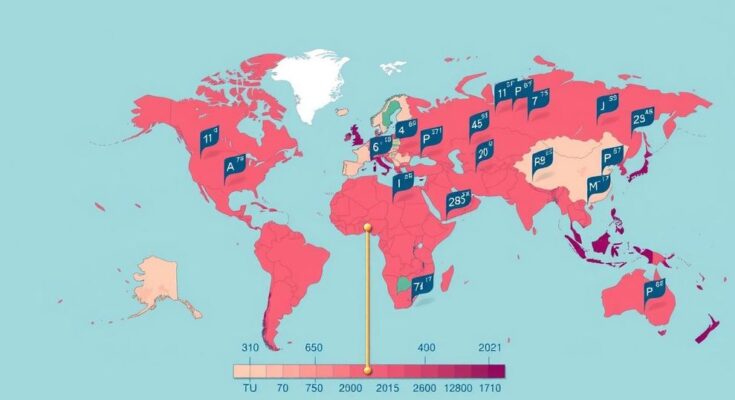In 2024, over 60 countries held elections, involving nearly half of the global population. Despite mass voting, the results reflected ongoing self-interest over collective concerns, with economic issues dominating the political landscape. Major incumbents like Biden and Modi faced significant losses, suggesting a shift towards populism amidst economic dissatisfaction. The ramifications of the elections will likely influence international relations and democratic norms significantly as we move into 2025.
The year 2024 witnessed an unprecedented electoral engagement, with over 60 countries, representing nearly half of the global population, conducting elections. This mass participation marked a significant step in democracy, reflecting humanity’s collective evolution. However, the outcomes were disheartening, suggesting a persistent trend of self-interest over collective welfare. Voters leaned towards immediate concerns, often prioritizing personal economic crises over long-term issues such as climate change.
In economically developed nations such as the United Kingdom, urgent issues dominated the electoral landscape. The Labour Party, led by Keir Starmer, achieved a significant victory, fueled by public anxiety over economic sustainability. Similarly, United States President Joe Biden experienced a backlash despite his efforts to reduce inflation. His inability to lower prices adequately and increase wages led to a voter shift towards Donald Trump, indicating a preference for short-term relief over long-term governance.
The trend of punishing incumbents remained apparent globally, as seen in the snap elections triggered in Germany following the no-confidence vote against Chancellor Olaf Scholz due to economic failures. Countries like India, South Africa, and parts of the European Union indicated a shift away from mainstream parties towards populism, driven largely by economic dissatisfaction. Notably, Trump’s resurgence in the U.S. emerged as a pivotal moment that could shape future political dynamics profoundly.
Among the notable votes, Trump’s presidential win commands attention as a potentially transformative event, correlated with the loss of support for prominent leaders like Emmanuel Macron and Narendra Modi, whose popularity waned amid economic challenges beyond their direct control. The ramifications of these elections extend beyond national borders, influencing global political relationships, particularly concerning Ukraine and Russia, where Putin’s administration continues to suppress democratic principles.
In conclusion, the electoral participation of nearly half the world’s population in 2024 highlighted a crucial year for democracy. The clear shift towards self-preserving motivations among voters underscores the need for deeper engagement with issues like climate change. The global repercussions of these elections may redefine international relations and democracy itself as we move forward into 2025. The essence of democracy continues to resonate, emphasizing that the pursuit of collective betterment remains imperative in the face of fleeting electoral results.
The year 2024 evolved into a pivotal moment in global democracy with nearly half the population participating in elections across over 60 countries. This phenomenon represents not only a remarkable collective achievement but also an opportunity to analyze evolving voter motivations and political outcomes. As numerous leaders faced electoral challenges due to economic dissatisfaction and rising populism, the results emphasize the complex challenges that democracy faces, particularly when long-term issues intersect with immediate hardships.
In summary, the 2024 electoral season reflected substantial global participation and engagement with democratic processes. However, the reliance on immediate economic concerns over collective issues like climate change points to a troubling tendency among voters to prioritize self-interest. As countries grapple with these emerging political dynamics, the necessity for compelling and inclusive governance remains crucial. The results from this year will undeniably shape the trajectory of international relations and the interpretation of democratic values going into 2025.
Original Source: www.cnn.com




